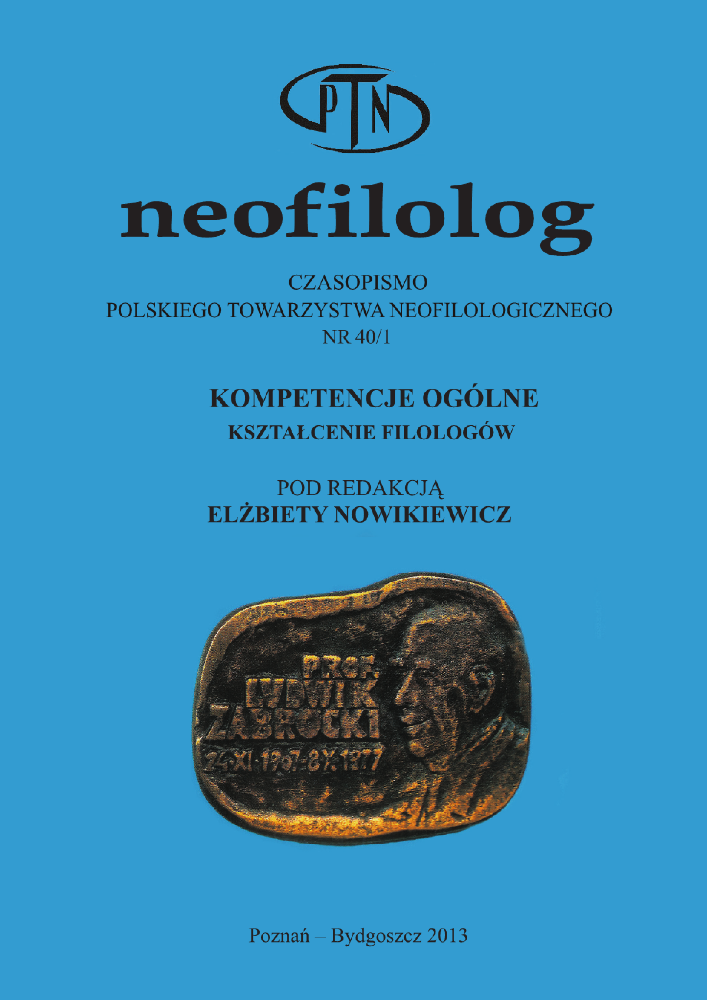Résumé
The completion of undergraduate L2 studies traditionally entails preparation of a BA dissertation on a selected topic. Since Polish ministerial regulations allow interpretations, the academic community has been electrified by the possibility of alternative solutions. The ensuing discussions result in emerging proposals to substitute the traditional paper with an essay form, or with total resignation from the written part in favor of a viva. This article considers the problem with regard to the idea of key competences for lifelong learning, as defined by The European Commission, which highlight the need for practicality. Analysis of the process of writing a dissertation and its evaluation helps to draw conclusions for possible improvements.Références
(12/07/2007) Rozporządzenie Ministra Nauki i Szkolnictwa Wyższego z dnia 12 lipca 2007 w sprawie standardów kształcenia ujętych w załączniku 29. http://www.lex.pl/ du-akt/-/akt/dz-u-07-164-1166 DW 29.10.2012.
(19/12/2008) Rozporządzenie Ministra Nauki i Szkolnictwa z 19 grudnia 2008 w sprawie tytułów zawodowych nadawanych absolwentom studiów i wzorów dyplomów oraz świadectw wydawanych przez uczelnie. http://isap.sejm.gov.pl/Deta ilsServlet?id=WDU20090110061 DW. 29.10.2012.
(2008/C 111/01). Zalecenie Parlamentu Europejskiego i Rady z dnia 23 kwietnia 2008 r. w sprawie ustanowienia europejskich ram kwalifikacji dla uczenia się przez całe życie http://eur-lex.europa.eu/LexUriServ/LexUriServ.do?uri=OJ:C:2008:111:0001: 0007:PL:PDF DW 29.10.2012.
(ERK) Europejskie Ramy Kwalifikacji dla uczenia się przez całe życie http://ec.europa.eu/education/pub/pdf/general/eqf/broch_pl.pdf DW. 29.10.2012 DW 29.10.2012.
(KK) Kompetencje kluczowe w uczeniu się przez całe życie. Europejskie ramy odniesienia. Załącznik do zalecenia Parlamentu Europejskiego i Rady z dnia 18 grudnia 2006. http://ec.europa.eu/dgs/education_culture/publ/pdf/ll-learning/keycomp_pl.pdf DW 29.10.2012.
(KRK) Rozporządzenie Ministra nauki i szkolnictwa Wyższego z dnia 2 listopada 2011 r. w sprawie Krajowych Ram Kwalifikacji dla Szkolnictwa Wyższego. http://www.nauka.gov.pl/fileadmin/user_upload/szkolnictwo/20120110_KRK_dla_SW.pdf DW 29.10.2012.
Bailey. S. 2001. Academic Writing: A Handbook for International Students. London and New York: Routledge.
Benson, P. 1997. « The philosophy and politics of learner autonomy ». (w) Autonomy an independence in language learning (red. P. Benson i P. Voller. P). London and New York: Longman 18-34.
Benson, P. 2001. Teaching and researching autonomy in language learning. Harlow: Pearson.
Bernstein, B. 1999. « Vertical and horizontal discourse: an essay ». British Journal of Sociology of Education 20, 2. Academic Research Library. 157-173.
Bernstein, B. 1971. Class, codes and control (Tom 1). London: Routledge and Kegan Paul.
Brown, J. D. 2001. Using surveys in language programs. Cambridge, UK: Cambridge University Press.
Byram, M. 1997. Teaching and assessing intercultural communicative competence. Clevedon: Multilingual Matters.
Byram, M., Nichols. A. i Stevens, D. (red.). 2001. Developing Intercultural Competence in Practice. Clevedon: Multilingual Matters.
Cummins, J. 1979. « Cognitive/academic language proficiency, linguistic interdependence, the optimal age question and some other matters ». Working Papers on Bilingualism 19. 197-205.
Cummins, J. 1980. « The cross-lingual dimension of language proficiency: Implications for bilingual education and the optimal age issue ». TESOL Quarterly 14. 175-187.
Dornyei, Z. 2003. Questionnaires in second language research. Construction, administration and processing. Mahwah, London: Laurence Erlbaum Associates Publishers.
Fairclough, N. 1996. Critical language awareness. Wydanie drugie. London i New York: Longman.
Lankiewicz, H. 2013. « Taming academic language. Reflections of a methodology teacher ». (w) The creative potential of the Word: from fiction to education (red. A. Szczepaniak-Kozak i H. Lankiewicz). PWSZ: Piła. 123-144.
Łobocki, M. 2006. Wprowadzenie do metodologii badań pedagogicznych. Kraków: Oficyna Wydawnicza ,,Impuls”.
Szkudlarek, T i Śliwierski B. 1991. Wyzwania Pedagogiki Krytycznej i antypedagogiki. Kraków: Impuls.
Terlikowski, T. P. i Zieliński, M. 2008. « Wyższa fikcja ». Wprost Nr 40. http://www.wprost.pl/ar/139783/Wyzsza-fikcja/?pg=0 DW 28.10.2012.
Van Lier. L. 2004. The ecology and semiotics of language learning. A sociocultural Perspective. Boston, Dordrecht, New York, London: Kluwer Academic Publishers.
Vygotsky, L., S. 1987. « Thinking and speech ». (Transl. N. Minick). (w) Collected Works of L.S. Vygotsky. Volume 1: problems of general psychology. New York: Plenum Press.
Wilczyńska, W. (red.). 2002. Autonomizacja w dydaktyce języków obcych. Doskonal-nie w komunikacji ustnej. Poznań: Wydawnictwo Naukowe UAM.
Zwiers, J. 2007. Building Academic Language: Essential Practices for Content Classrooms. San Francisco: Jossey-Bass Teacher.
Żurawska, B. 2010. Kompetencje Kluczowe. Informator dla rodziców i opiekunów. Wyższa Szkoła Pedagogiczna TWP w Warszawie, Wydział Nauk Humanistyczno-Społecznych w Olsztynie. http://www.akademiamlodychnoblistow.pl/files /publikacje/TWPWSP_PoradnikRodzicow_akcept.pdf DW 29.10.2012
Licence
© Hadrian Lankiewicz 2019

Ce travail est disponible sous licence Creative Commons Attribution - Pas de Modification 4.0 International.
Auteurs :
Les auteurs de textes acceptés pour publication dans la revue Neofilolog sont tenus de remplir, signer et renvoyer à l'adresse de la rédaction, un accord sur l'octroi d'une licence gratuite pour les œuvres, avec obligation d'accorder une sous-licence CC.
En vertu de cet accord, les auteurs des textes publiés dans la revue Neofilolog accordent à l'Université Adam Mickiewicz de Poznań une licence non exclusive et gratuite et permettent l'utilisation de la sous-licence Creative Commons Attribution-NoDerivatives 4.0 International (CC BY-ND 4.0).
Les auteurs se réservent le droit de disposer librement de l'œuvre.
Utilisateurs :
Les utilisateurs d'Internet intéressés ont le droit d'utiliser les œuvres publiées à partir de l'année 2017 sous réserve des conditions suivantes :
- reconnaissance de la qualité d'auteur - l'obligation de fournir des informations sur la qualité d'auteur, le titre, la source (liens vers l'œuvre originale, DOI) et la licence, ainsi que l'œuvre distribuée ;
- sans créer d'œuvres dérivées - l'œuvre doit être conservée dans sa forme originale, p. ex. les traductions ou les interprétations ne peuvent être distribuées sans le consentement de l'auteur.
Tous les textes publiés sont soumis au droit d'auteur.
Autres :
L'Université Adam Mickiewicz de Poznań se réserve le droit à la revue dans son ensemble (mise en page, forme graphique, titre, conception de la couverture, logo, etc.).
.
